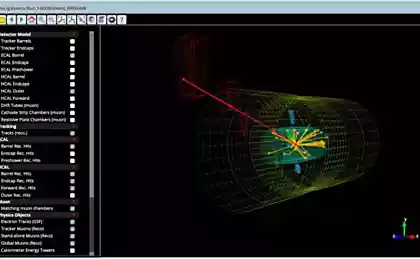195
Big data: own information, own the world!
What is Big Data, a term we hear all over the world? How can we use new approaches to work with huge amounts of information in education?
http://en.euronews.com/embed/306511/ Kenneth Cukier: Big Data Guru
Big data, the valuable capital of our time, must find its place in education. Kenneth Cukier, author of a book on big data and editor of the authoritative publication The Economist, said: “Very many aspects of our lives can be translated into information format, whether it’s renting a house, counting calories consumed at lunch, the most visited web pages ...” By looking at these large amounts of data, we can come to unexpected and productive conclusions. They would never come to them by analyzing information in parts, in “small portions.”
Cukier is convinced that the modern school does not have the right to miss this opportunity: We urgently need to remove our children from the educational system built in another era, in the era of industrialization, conveyor work. Today we have a lot to choose for ourselves, including education. We can find, with the help of search engines, libraries on Google, on Amazon, almost everything that interests us - to learn what you need in life. That is how our children are taught.”
Arizona: mathematics online
What if universities started designing programs for students based on what young people were interested in? The statistics of “clicks” made by students can help in this... What information are they looking for? Find out what?
The University of Arizona has developed programs based on “big data” to help teachers. Every time a student watches a video, reads an explanation, solves a problem or writes a test, the server receives information about how successfully it works, how well the content is selected for it.
Irene Blume, a professor of mathematics, said: It’s a very personalized program that’s really tailored to everyone’s needs. We see that in the same group, someone gave today’s topic to someone easily, the student literally skipped it, “cried with a mouse.” Well, someone stayed in it for a long time. Maybe he needs my explanation. The system helps us to tailor the course to the needs of everyone.”
Statistics are produced, then algorithms are run that compare that student to thousands or even millions of others. Inevitably, patterns will emerge. It is possible that students with some common psychometric characteristics are not given the same topics. And here again comes the teacher. .
The problem is the cost of a license to use the program. It's a big one, a hundred dollars a month per student. Universities agree to bear the costs, believing that this is an adequate price to prevent students from falling behind and even dropping out. How to compensate for the costs of new technologies? Raising admissions fees. !
China: Diagnostics of Big Data
Seven Chinese universities are training specialists to work with big data. By the end of the year, 40 thousand young professionals should receive diplomas.
IBM participates in the equipment of Chinese universities and the training of teachers. Eric Guang, a spokesperson at Beijing Polytechnic University, said: Students need to be taught not only to read big data correctly, but also to draw conclusions from what they read. What can then be applied in real business, in industrial industries, banking, insurance. Students need to learn how to solve specific problems in these areas through proper information analysis. In banking, for example, big data is needed to predict risks, prevent theft from accounts, in general the activities of attackers.
P.S. And remember, just changing our consumption – together we change the world!
Source: en.euronews.com/2015/05/22/knowledge-is-power-how-big-data-is-transforming-education/
http://en.euronews.com/embed/306511/ Kenneth Cukier: Big Data Guru
Big data, the valuable capital of our time, must find its place in education. Kenneth Cukier, author of a book on big data and editor of the authoritative publication The Economist, said: “Very many aspects of our lives can be translated into information format, whether it’s renting a house, counting calories consumed at lunch, the most visited web pages ...” By looking at these large amounts of data, we can come to unexpected and productive conclusions. They would never come to them by analyzing information in parts, in “small portions.”
Cukier is convinced that the modern school does not have the right to miss this opportunity: We urgently need to remove our children from the educational system built in another era, in the era of industrialization, conveyor work. Today we have a lot to choose for ourselves, including education. We can find, with the help of search engines, libraries on Google, on Amazon, almost everything that interests us - to learn what you need in life. That is how our children are taught.”
Arizona: mathematics online
What if universities started designing programs for students based on what young people were interested in? The statistics of “clicks” made by students can help in this... What information are they looking for? Find out what?
The University of Arizona has developed programs based on “big data” to help teachers. Every time a student watches a video, reads an explanation, solves a problem or writes a test, the server receives information about how successfully it works, how well the content is selected for it.
Irene Blume, a professor of mathematics, said: It’s a very personalized program that’s really tailored to everyone’s needs. We see that in the same group, someone gave today’s topic to someone easily, the student literally skipped it, “cried with a mouse.” Well, someone stayed in it for a long time. Maybe he needs my explanation. The system helps us to tailor the course to the needs of everyone.”
Statistics are produced, then algorithms are run that compare that student to thousands or even millions of others. Inevitably, patterns will emerge. It is possible that students with some common psychometric characteristics are not given the same topics. And here again comes the teacher. .
The problem is the cost of a license to use the program. It's a big one, a hundred dollars a month per student. Universities agree to bear the costs, believing that this is an adequate price to prevent students from falling behind and even dropping out. How to compensate for the costs of new technologies? Raising admissions fees. !
China: Diagnostics of Big Data
Seven Chinese universities are training specialists to work with big data. By the end of the year, 40 thousand young professionals should receive diplomas.
IBM participates in the equipment of Chinese universities and the training of teachers. Eric Guang, a spokesperson at Beijing Polytechnic University, said: Students need to be taught not only to read big data correctly, but also to draw conclusions from what they read. What can then be applied in real business, in industrial industries, banking, insurance. Students need to learn how to solve specific problems in these areas through proper information analysis. In banking, for example, big data is needed to predict risks, prevent theft from accounts, in general the activities of attackers.
P.S. And remember, just changing our consumption – together we change the world!
Source: en.euronews.com/2015/05/22/knowledge-is-power-how-big-data-is-transforming-education/























